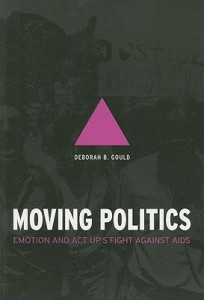Faculty Publications
How Green Became Good: Urbanized Nature and the Making of Cities and Citizens (2021)
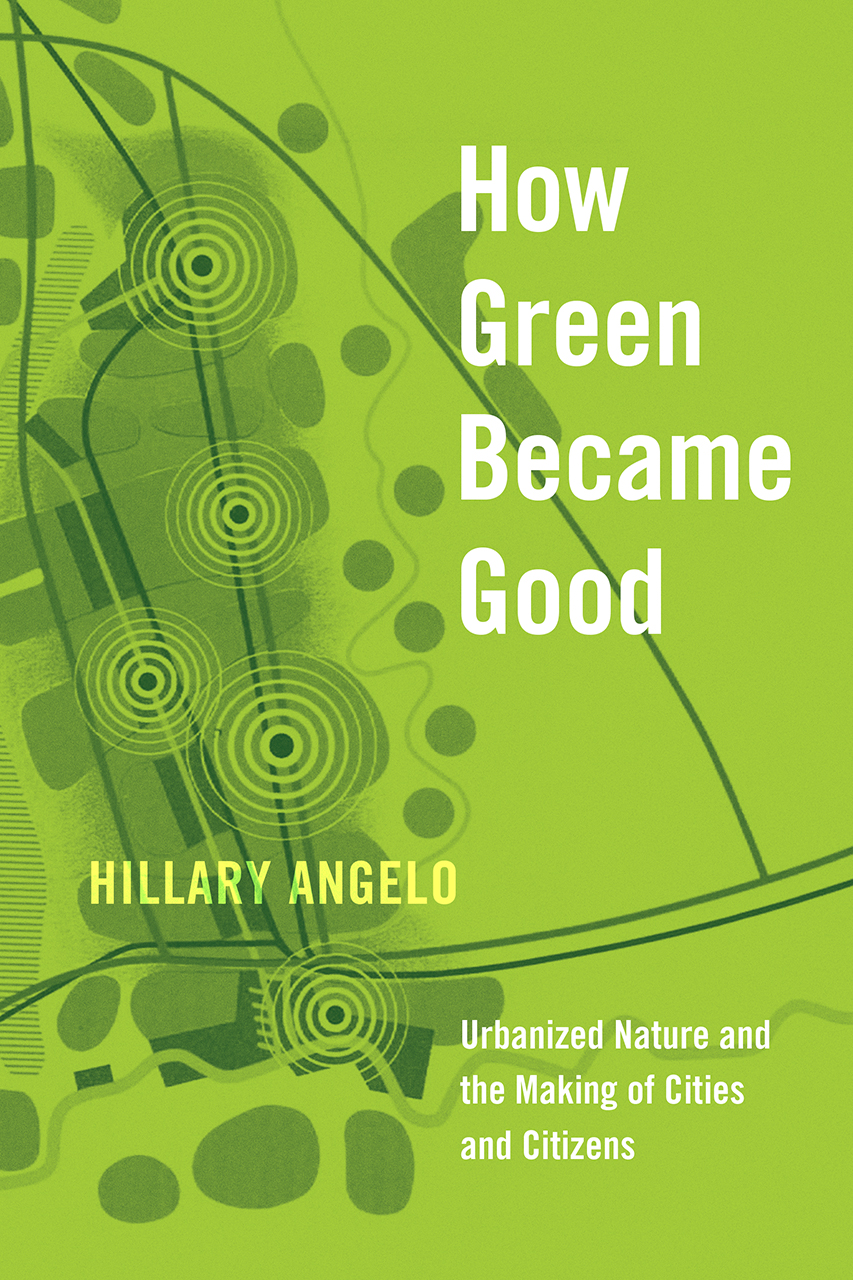 As projects like Manhattan’s High Line, Chicago’s 606, China’s eco-cities, and Ethiopia’s tree-planting efforts show, cities around the world are devoting serious resources to urban greening. Formerly neglected urban spaces and new high-end developments draw huge crowds thanks to the considerable efforts of city governments. But why are greening projects so widely taken up, and what good do they do? In How Green Became Good, Hillary Angelo uncovers the origins and meanings of the enduring appeal of urban green space, showing that city planners have long thought that creating green spaces would lead to social improvement. Turning to Germany’s Ruhr Valley (a region that, despite its ample open space, was “greened” with the addition of official parks and gardens), Angelo shows that greening is as much a social process as a physical one. She examines three moments in the Ruhr Valley's urban history that inspired the creation of new green spaces: industrialization in the late nineteenth century, postwar democratic ideals of the 1960s, and industrial decline and economic renewal in the early 1990s. Across these distinct historical moments, Angelo shows that the impulse to bring nature into urban life has persistently arisen as a response to a host of social changes, and reveals an enduring conviction that green space will transform us into ideal inhabitants of ideal cities. Ultimately, however, she finds that the creation of urban green space is more about how we imagine social life than about the good it imparts.
As projects like Manhattan’s High Line, Chicago’s 606, China’s eco-cities, and Ethiopia’s tree-planting efforts show, cities around the world are devoting serious resources to urban greening. Formerly neglected urban spaces and new high-end developments draw huge crowds thanks to the considerable efforts of city governments. But why are greening projects so widely taken up, and what good do they do? In How Green Became Good, Hillary Angelo uncovers the origins and meanings of the enduring appeal of urban green space, showing that city planners have long thought that creating green spaces would lead to social improvement. Turning to Germany’s Ruhr Valley (a region that, despite its ample open space, was “greened” with the addition of official parks and gardens), Angelo shows that greening is as much a social process as a physical one. She examines three moments in the Ruhr Valley's urban history that inspired the creation of new green spaces: industrialization in the late nineteenth century, postwar democratic ideals of the 1960s, and industrial decline and economic renewal in the early 1990s. Across these distinct historical moments, Angelo shows that the impulse to bring nature into urban life has persistently arisen as a response to a host of social changes, and reveals an enduring conviction that green space will transform us into ideal inhabitants of ideal cities. Ultimately, however, she finds that the creation of urban green space is more about how we imagine social life than about the good it imparts.Use code UCPSOC for 20% off from Chicago.
Solidarity Economics: Why Mutuality and Movements Matter (2021)
 Traditional economics is built on the assumption of self-interested individuals seeking to maximize personal gain, but that is far from the whole story. Sharing, caring, and a desire to uphold the collective good are also powerful motives. In a world wracked by inequality, social divisions, and ecological destruction, can we build an alternative economics based on cooperation?
Traditional economics is built on the assumption of self-interested individuals seeking to maximize personal gain, but that is far from the whole story. Sharing, caring, and a desire to uphold the collective good are also powerful motives. In a world wracked by inequality, social divisions, and ecological destruction, can we build an alternative economics based on cooperation?In this book Chris Benner and Manuel Pastor invite us to imagine a new sort of solidarity economics – an approach grounded in our instincts for connection and community – and in so doing, actually build a more robust and sustainable economy. They argue that our current economy is already deeply dependent on mutuality, but that the inequality and fragmentation created by the status quo undermine this mutuality and with it our economic well-being. They outline the theoretical framing, policy agenda, and social movements that we need to revive solidarity and apply it to whole societies.
Solidarity Economics is an essential read for anyone who longs for a fairer economy that can generate prosperity and preserve the planet.
More information on Solidarity Economics, a collaboration between the Institute for Social Transformation at UC Santa Cruz and the USC Dornsife Equity Research Institute that uses data and analysis to contribute to a more powerful, well-resourced, intersectional, and intersectoral movement for equity, can be found at: https://solidarityeconomics.org/.
Women without Class: Girls, Race, and Identity, With a New Introduction (2014)
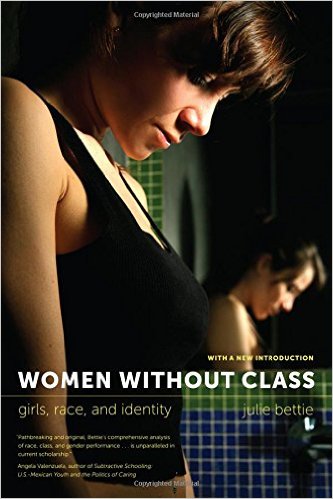
Winner of the 2004 Sex and Gender Distinguished Book Award!
In this ethnographic examination of Mexican-American and white girls coming of age in California’s Central Valley, Julie Bettie turns class theory on its head, asking what cultural gestures are involved in the performance of class, and how class subjectivity is constructed in relationship to color, ethnicity, gender, and sexuality. A new introduction contextualizes the book for the contemporary moment and situates it within current directions in cultural theory.
Investigating the cultural politics of how inequalities are both reproduced and challenged, Bettie examines the discursive formations that provide a context for the complex identity performances of contemporary girls. The book’s title refers at once to young working-class women who have little cultural capital to enable class mobility; to the fact that analyses of class too often remain insufficiently transformed by feminist, ethnic, and queer studies; and to the failure of some feminist theory itself to theorize women as class subjects.Women without Class (2003) makes a case for analytical and political attention to class, but not at the expense of attention to other social formations.Sweetness in the Blood Race, Risk, and Type 2 Diabetes (2021)
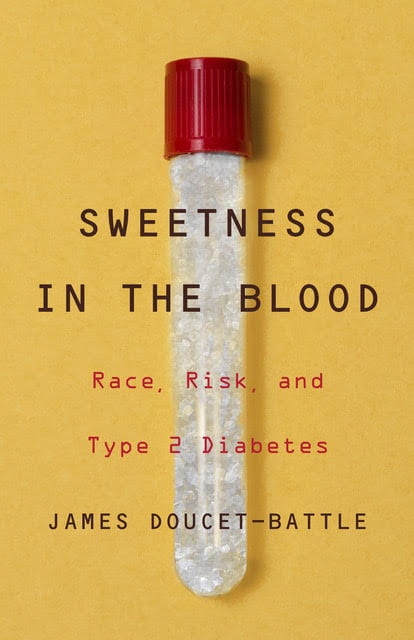 Decades of data cannot be ignored: African American adults are far more likely to develop Type 2 diabetes than white adults. But has science gone so far in racializing diabetes as to undermine the search for solutions? In a rousing indictment of the idea that notions of biological race should drive scientific inquiry, Sweetness in the Blood provides an ethnographic picture of biotechnology’s framings of Type 2 diabetes risk and race and, importantly, offers a critical examination of the assumptions behind the recruitment of African American and African-descent populations for Type 2 diabetes research.
Decades of data cannot be ignored: African American adults are far more likely to develop Type 2 diabetes than white adults. But has science gone so far in racializing diabetes as to undermine the search for solutions? In a rousing indictment of the idea that notions of biological race should drive scientific inquiry, Sweetness in the Blood provides an ethnographic picture of biotechnology’s framings of Type 2 diabetes risk and race and, importantly, offers a critical examination of the assumptions behind the recruitment of African American and African-descent populations for Type 2 diabetes research. James Doucet-Battle begins with a historical overview of how diabetes has been researched and framed racially over the past century, chronicling one company’s efforts to recruit African Americans to test their new diabetes risk-score algorithm with the aim of increasing the clinical and market value of the firm’s technology. He considers African American reticence about participation in biomedical research and examines race and health disparities in light of advances in genomic sequencing technology. Doucet-Battle concludes by emphasizing that genomic research into sub-Saharan ancestry in fact underlines the importance of analyzing gender before attempting to understand the notion of race. No disease reveals this more than Type 2 diabetes.
Sweetness in the Blood challenges the notion that the best approach to understanding, managing, and curing Type 2 diabetes is through the lens of race. It also transforms how we think about sugar, filling a neglected gap between the sugar- and molasses-sweetened past of the enslaved African laborer and the high-fructose corn syrup- and corporate-fed body of the contemporary consumer-laborer.
Original Nation Approaches to Inter-National Law: The Quest for the Rights of Indigenous Peoples and Nature in the Age of Anthropocene (2021)
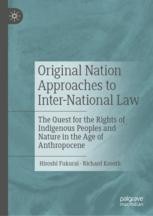 This book introduces the Original Nation scholarship to examine the historical genealogy of the nation’s struggles against the state. A fundamentally different portrait of history, geography, politics, and the role of law emerges when the perspective of the nation and peoples is placed at the center of geopolitical analysis of global affairs. In contrast to traditional and canonical state-centric narratives, the Original Nation scholarship offers a diametrically distinct “on-the-ground” and “bottom-up” portrait of the struggle, resistance, and defiance of the nation and peoples. It exposes persistent global patterns of genocide, ecocide, and ethnocide that have resulted from attempts by the state to occupy, suppress, exploit, and destroy the nation. The Original Nation scholarship offers a powerful and widely applicable intellectual tool to examine the history of resilience, emancipatory struggles, and collective efforts to build a vibrant alternative world among the nation and peoples across the globe.
This book introduces the Original Nation scholarship to examine the historical genealogy of the nation’s struggles against the state. A fundamentally different portrait of history, geography, politics, and the role of law emerges when the perspective of the nation and peoples is placed at the center of geopolitical analysis of global affairs. In contrast to traditional and canonical state-centric narratives, the Original Nation scholarship offers a diametrically distinct “on-the-ground” and “bottom-up” portrait of the struggle, resistance, and defiance of the nation and peoples. It exposes persistent global patterns of genocide, ecocide, and ethnocide that have resulted from attempts by the state to occupy, suppress, exploit, and destroy the nation. The Original Nation scholarship offers a powerful and widely applicable intellectual tool to examine the history of resilience, emancipatory struggles, and collective efforts to build a vibrant alternative world among the nation and peoples across the globe.The Introduction of Civil Jury Trials Will Transform Japan: Lessons from Experiences of Civil Jury Trials in Okinawa (2020)
 The Introduction of Civil Jury Trials Will Transform Japan: Lessons from Experiences of Civil Jury Trials in Okinawa (2020) was written in Japanese, designed to educate Japanese audiences about the importance of introducing the civil jury trial system in Japan, especially in the post-Fukushima nuclear disaster era, in which most of the civil lawsuits brought by nuclear victims against the Japanese government and operators of exploded nuclear plants had been thrown out by Japan's bureaucratic professional judges (English description PDF).
The Introduction of Civil Jury Trials Will Transform Japan: Lessons from Experiences of Civil Jury Trials in Okinawa (2020) was written in Japanese, designed to educate Japanese audiences about the importance of introducing the civil jury trial system in Japan, especially in the post-Fukushima nuclear disaster era, in which most of the civil lawsuits brought by nuclear victims against the Japanese government and operators of exploded nuclear plants had been thrown out by Japan's bureaucratic professional judges (English description PDF).Japan and Civil Jury Trials The Convergence of Force (2015)
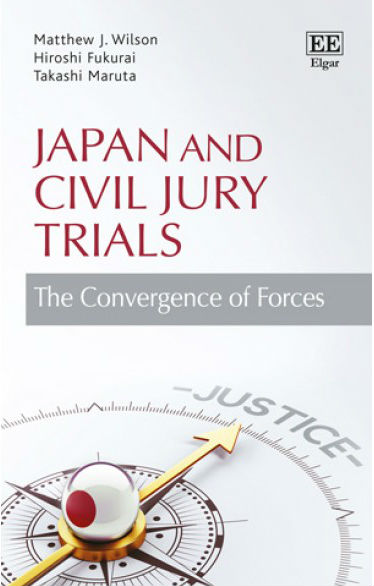 As societies around the world increasingly face complex challenges, effective solutions are at a premium. In response, reformers have advanced varied forms of jury systems as means of fostering positive political, economic, and social change. Many countries have recently integrated lay participation into their justice systems to effect fundamental societal change, advance public policymaking, and manifest popular sovereignty. This book showcases Japan’s successes and challenges in recently adopting a quasi-jury system for serious criminal trials, and advocates that the convergence of various forces makes this an ideal time for Japan to expand lay participation into the civil realm.
As societies around the world increasingly face complex challenges, effective solutions are at a premium. In response, reformers have advanced varied forms of jury systems as means of fostering positive political, economic, and social change. Many countries have recently integrated lay participation into their justice systems to effect fundamental societal change, advance public policymaking, and manifest popular sovereignty. This book showcases Japan’s successes and challenges in recently adopting a quasi-jury system for serious criminal trials, and advocates that the convergence of various forces makes this an ideal time for Japan to expand lay participation into the civil realm.East Asia’s Renewed Respect for the Rule of Law in the 21st Century: The Future of Legal and Judicial Landscapes in East Asia (2015)
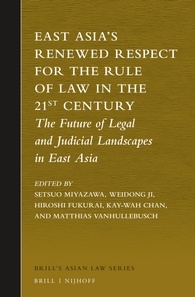 This volume showcases the most recent research on the future of the legal and judicial landscape in East Asia and its renewed respect for the rule of law in the 21st century. The book features research on emerging judicial stratifications in the legal profession; war crimes and their legacies in the post-colonial era; citizens' participation in the justice system; gender, law, legal culture and profession as well as environmental justice.
This volume showcases the most recent research on the future of the legal and judicial landscape in East Asia and its renewed respect for the rule of law in the 21st century. The book features research on emerging judicial stratifications in the legal profession; war crimes and their legacies in the post-colonial era; citizens' participation in the justice system; gender, law, legal culture and profession as well as environmental justice.Nuclear Tsunami: The Japanese Government and America's Role in the Fukushima Disaster by Richard Krooth; Morris Edelson and Hiroshi Fukurai (2015)
 This book begins with the analysis of America’s post-war intelligence operations, propaganda campaigns, and strategic psychological warfare in Japan. Banking on nuclear safety myths, Japan promoted an aggressive policy of locating and building nuclear power plants in depopulated areas suffering from a significant decline of local industries and economies. The Fukushima nuclear disaster substantiated that U.S. propaganda programs left a long lasting legacy in Japan and beyond and created the fertile ground for the future nuclear disaster. The book reveals Japan's tripartite organization of the dominating state, media-monopoly, and nuclear-plant oligarchy advancing nuclear proliferation. It details America’s unprecedented pro-nuclear propaganda campaigns; Japan’s secret ambitions to develop its own nuclear bombs; U.S. dumping of reprocessed plutonium on Japan; and the joint U.S.-Nippon propaganda campaigns for “safe” nuclear-power and the current “safe-nuclear particles” myths. The study shows how the bankruptcy of the central state has led to increased burdens on the population in post-nuclear tsunami era, and the ensuing dangerous ionization of the population now reaching into the future.
This book begins with the analysis of America’s post-war intelligence operations, propaganda campaigns, and strategic psychological warfare in Japan. Banking on nuclear safety myths, Japan promoted an aggressive policy of locating and building nuclear power plants in depopulated areas suffering from a significant decline of local industries and economies. The Fukushima nuclear disaster substantiated that U.S. propaganda programs left a long lasting legacy in Japan and beyond and created the fertile ground for the future nuclear disaster. The book reveals Japan's tripartite organization of the dominating state, media-monopoly, and nuclear-plant oligarchy advancing nuclear proliferation. It details America’s unprecedented pro-nuclear propaganda campaigns; Japan’s secret ambitions to develop its own nuclear bombs; U.S. dumping of reprocessed plutonium on Japan; and the joint U.S.-Nippon propaganda campaigns for “safe” nuclear-power and the current “safe-nuclear particles” myths. The study shows how the bankruptcy of the central state has led to increased burdens on the population in post-nuclear tsunami era, and the ensuing dangerous ionization of the population now reaching into the future. Race in the Jury Box: Affirmative Action in Jury Selection (2003)
 Race in the Jury Box focuses on the racially unrepresentative jury as one of the remaining barriers to racial equality and a recurring source of controversy in American life. Because members of minority groups remain underrepresented on juries, various communities have tried race-conscious jury selection, termed "affirmative jury selection." The authors argue that affirmative jury selection can insure fairness, verdict legitimization, and public confidence in the justice system. This book offers a critical analysis and systematic examination of possible applications of race-based jury selection, examining the public perception of these measures and their constitutionality. The authors make use of court cases, their own experiences as jury consultants, and jury research, as well as statistical surveys and analysis. The work concludes with the presentation of four strategies for affirmative jury selection.
Race in the Jury Box focuses on the racially unrepresentative jury as one of the remaining barriers to racial equality and a recurring source of controversy in American life. Because members of minority groups remain underrepresented on juries, various communities have tried race-conscious jury selection, termed "affirmative jury selection." The authors argue that affirmative jury selection can insure fairness, verdict legitimization, and public confidence in the justice system. This book offers a critical analysis and systematic examination of possible applications of race-based jury selection, examining the public perception of these measures and their constitutionality. The authors make use of court cases, their own experiences as jury consultants, and jury research, as well as statistical surveys and analysis. The work concludes with the presentation of four strategies for affirmative jury selection.Moving Politics: Emotion and ACT Up's Fight Against AIDS (2009)
Winner of the 2010 Ruth Benedict Book Prize and Distinguished Contribution to Scholarship Best Book Award!
In the late 1980s, after a decade spent engaged in more routine interest-group politics, thousands of lesbians and gay men responded to the AIDS crisis by defiantly and dramatically taking to the streets. But by the early 1990s, the organization they founded, ACT UP, was no more—even as the AIDS epidemic raged on. Weaving together interviews with activists, extensive research, and reflections on the author’s time as a member of the organization, Moving Politics is the first book to chronicle the rise and fall of ACT UP, highlighting a key factor in its trajectory: emotion.
Surprisingly overlooked by many scholars of social movements, emotion, Gould argues, plays a fundamental role in political activism. From anger to hope, pride to shame, and solidarity to despair, feelings played a significant part in ACT UP’s provocative style of protest, which included raucous demonstrations, die-ins, and other kinds of street theater. Detailing the movement’s public triumphs and private setbacks, Moving Politics is the definitive account of ACT UP’s origin, development, and decline as well as a searching look at the role of emotion in contentious politics.
The City Is the Factory: New Solidarities and Spatial Strategies in an Urban Age by Miriam Greenberg (2017)

Urban public spaces, from the streets and squares of Buenos Aires to Zuccotti Park in New York City, have become the emblematic sites of contentious politics in the twenty-first century. As the contributors to The City Is the Factory argue, this resurgent politics of the square is itself part of a broader shift in the primary locations and targets of popular protest from the workplace to the city. This shift is due to an array of intersecting developments: the concentration of people, profit, and social inequality in growing urban areas; the attacks on and precarity faced by unions and workers' movements; and the sense of possibility and actual leverage afforded by local politics and the tactical use of urban space. Thus, "the city"—from the town square to the banlieu—is becoming like the factory of old: a site of production and profit-making as well as new forms of solidarity, resistance, and social reimagining.
We see examples of the city as factory in new place-based political alliances, as workers and the unemployed find common cause with "right to the city" struggles. Demands for jobs with justice are linked with demands for the urban commons—from affordable housing to a healthy environment, from immigrant rights to “urban citizenship” and the right to streets free from both violence and racially biased policing. The case studies and essays in The City Is the Factory provide descriptions and analysis of the form, substance, limits, and possibilities of these timely struggles. Edited by Miriam Greenberg, Penny Lewis
Crisis Cities: Disaster and Redevelopment in New York and New Orleans (2014)
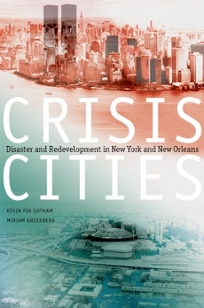
Uncovers the political, economic, and cultural relationships between urbanization and crisis to provide a new perspective on how disasters and crises have influenced the development of cities.
Branding New York: How a City in Crisis was Sold to the World (2008)

Winner of the 2009 Robert Park Book Award for best Community and Urban Sociology book!
Branding New York traces the rise of New York City as a brand and the resultant transformation of urban politics and public life. Greenberg addresses the role of "image" in urban history, showing who produces brands and how, and demonstrates the enormous consequences of branding. She shows that the branding of New York was not simply a marketing tool; rather it was a political strategy meant to legitimatize market-based solutions over social objectives.
Contesting Race and Citizenship: Youth Politics in the Black Mediterranean (Cornell University Press, 2022)
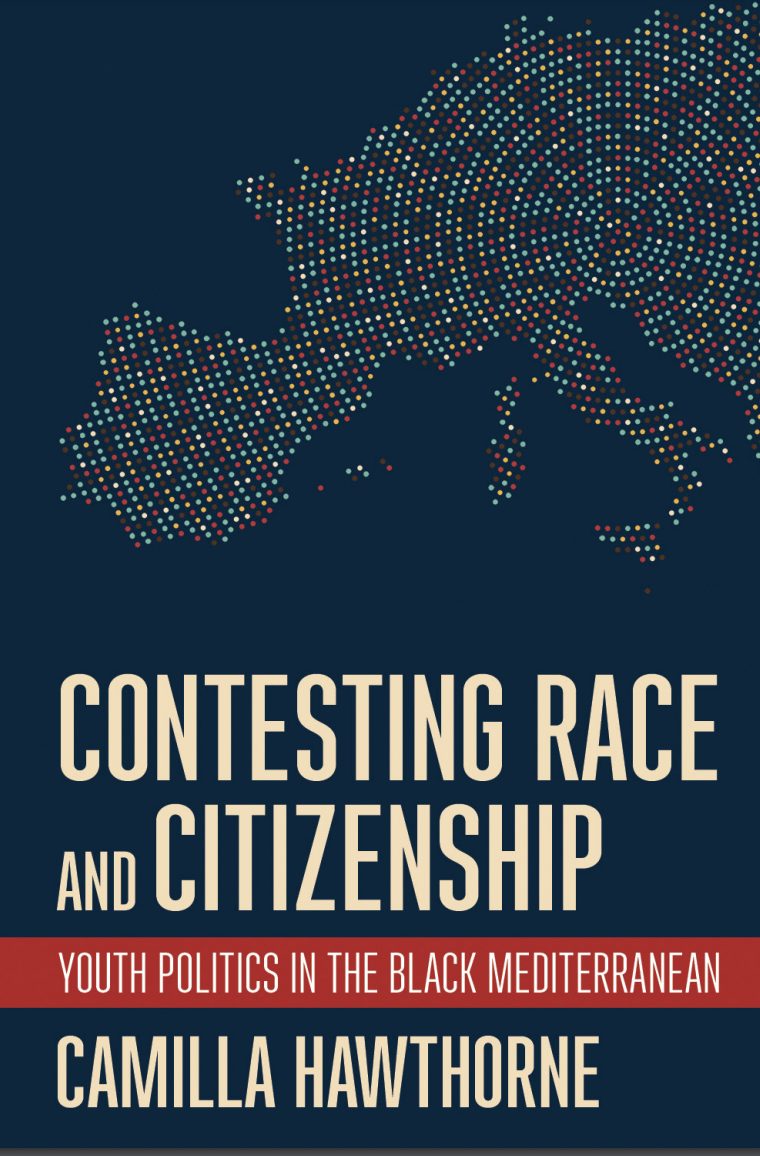 Contesting Race and Citizenship is an original study of Black politics and varieties of political mobilization in Italy. Although there is extensive research on first-generation immigrants and refugees who traveled from Africa to Italy, there is little scholarship about the experiences of Black people who were born and raised in Italy. Camilla Hawthorne focuses on the ways Italians of African descent have become entangled with processes of redefining the legal, racial, cultural, and economic boundaries of Italy and by extension, of Europe itself.
Contesting Race and Citizenship is an original study of Black politics and varieties of political mobilization in Italy. Although there is extensive research on first-generation immigrants and refugees who traveled from Africa to Italy, there is little scholarship about the experiences of Black people who were born and raised in Italy. Camilla Hawthorne focuses on the ways Italians of African descent have become entangled with processes of redefining the legal, racial, cultural, and economic boundaries of Italy and by extension, of Europe itself.Contesting Race and Citizenship opens discussions of the so-called migrant "crisis" by focusing on a generation of Black people who, although born or raised in Italy, have been thrust into the same racist, xenophobic political climate as the immigrants and refugees who are arriving in Europe from the African continent. Hawthorne traces not only mobilizations for national citizenship but also the more capacious, transnational Black diasporic possibilities that emerge when activists confront the ethical and political limits of citizenship as a means for securing meaningful, lasting racial justice—possibilities that are based on shared critiques of the racial state and shared histories of racial capitalism and colonialism.
The open-access ebook version can be downloaded at: https://d119vjm4apzmdm.
cloudfront.net/open-access/ pdfs/9781501762307.pdf The Black Mediterranean: Bodies, Borders and Citizenship (2021)

This co-edited volume aims to problematise and rethink the contemporary European migrant crisis in the Central Mediterranean through the lens of the Black Mediterranean. Bringing together scholars working in geography, political theory, sociology, and cultural studies, this volume takes the Black Mediterranean as a starting point for asking and answering a set of crucial questions about the racialized production of borders, bodies, and citizenship in contemporary Europe: what is the role of borders in controlling migrant flows from North Africa and the Middle East?; what is the place for black bodies in the Central Mediterranean context?; what is the relevance of the citizenship in reconsidering black subjectivities in Europe? The volume will be divided into three parts. After the introduction, which will provide an overview of the theoretical framework and the individual contributions, Part I focuses on the problem of borders, Part II features essays focused on the body, and Part III is dedicated to citizenship.
Rethinking Recess Creating Safe and Inclusive Playtime for All Children in School (2019)
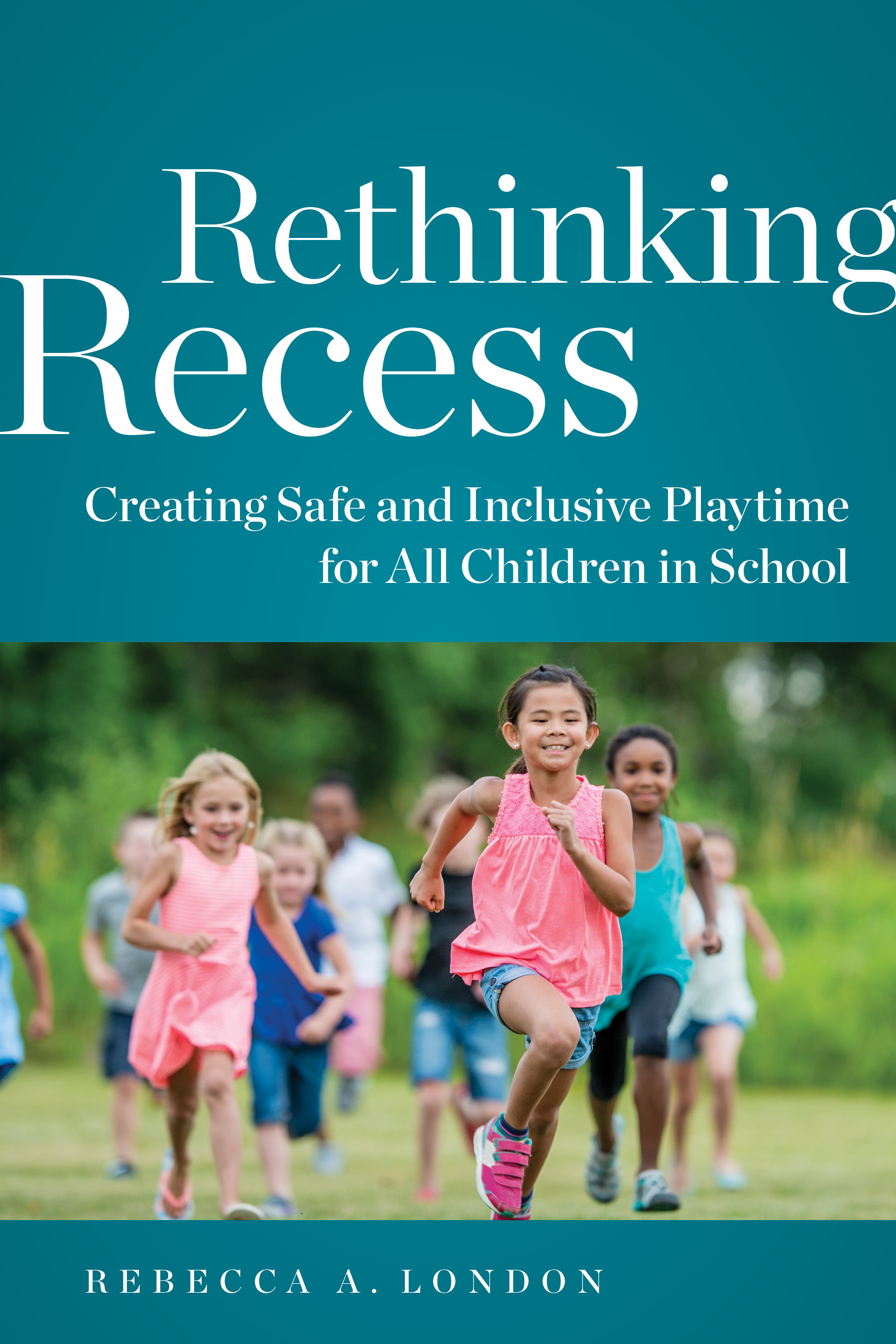 In Rethinking Recess, sociologist Rebecca A. London argues that recess has been overlooked as an essential part of the elementary school experience, with major implications for how well schools serve all students equitably and responsively. Given its potential to support students’ social and emotional learning and physical activity, London says, recess should be designed intentionally, with attention to safety, health, and engagement.
In Rethinking Recess, sociologist Rebecca A. London argues that recess has been overlooked as an essential part of the elementary school experience, with major implications for how well schools serve all students equitably and responsively. Given its potential to support students’ social and emotional learning and physical activity, London says, recess should be designed intentionally, with attention to safety, health, and engagement.The book shows how school leaders and other educators—even those with budget and space constraints—can make the most of recess time by using a variety of proven strategies, and also provides examples of schools that have put these strategies to use. Rethinking Recess highlights the need for equitable access to recess and supplies alternatives to the common practice of withholding recess for misbehavior or as a punishment, along with other policy recommendations, assessment tools, and resources that practitioners can use to redesign recess.
When unstructured or poorly planned, recess can be a major source of disciplinary incidents and office referrals, eating into instructional time, adding stress, and affecting perceptions of school climate for students and staff, among other negative outcomes. Conversely, taking organizational steps to create a well‐designed recess can engage students, improve school climate, build valuable social and emotional skills, reduce behavioral incidents, and promote healthy lifestyles.
Meticulously researched and filled with practical and often easy‐to‐implement changes for recess policies and practice, this book provides a critical resource for school leaders and others looking to make every aspect of school a positive one for students.
(20% discount code: F19RRC good until Feb 2020; flyer)
From Data to Action (2013)
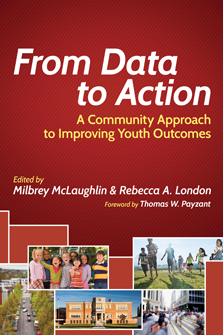
This book is a welcome guide for educators, civic leaders, and researchers looking for ways to leverage data to identify the most effective policies, interventions, and use of resources for their communities.
In the current era of reform, much has been made of the fact that there are many influences that shape children beyond the walls of the schoolhouse. Powerful data “warehouses” have been built to track children and interventions within school bureaucracies and in other social service sectors. Yet these data systems are rarely linked to provide a holistic view of how individual children are faring both in and out of school and which interventions—or combinations thereof—are most promising. Privacy laws and institutional traditions have made such collaborations difficult, if not impossible. Until now.
The Youth Data Archive, based at the John W. Gardner Center for Youth and Their Communities at Stanford University, is an effort to blaze a new path to the productive use of cross-agency data now employed by researchers, school officials, and service providers in San Francisco, San Mateo, Alameda, and Santa Clara counties.
Editors Milbrey McLaughlin and Rebecca A. London, leaders of the Youth Data Archive, bring together participants who describe the initiative and its challenges and successes. The participants also give detailed background on how the archive was built and how it has led to improvements in services, particularly for children at risk. This book is a welcome guide for educators, civic leaders, and researchers looking for ways to leverage data to identify the most effective policies, interventions, and use of resources for their communities.Precarity and Belonging: Labor, Migration, and Noncitizenship (2021)
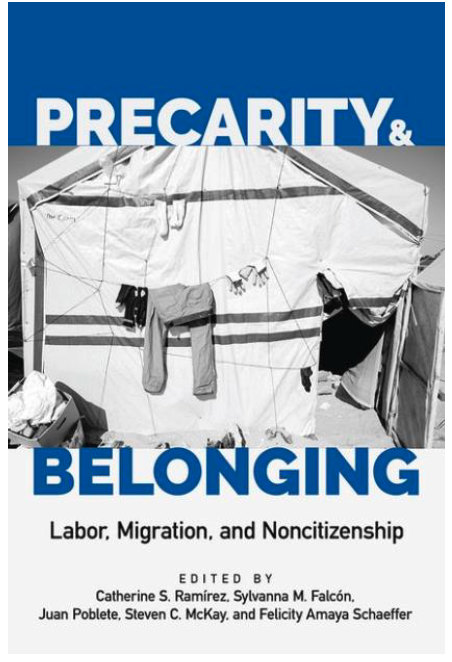 Precarity and Belonging: Labor, Migration, and Noncitizenship (Rutgers University Press 2021) examines how the movement of people and their incorporation, marginalization, and exclusion, under epochal conditions of labor and social precarity affecting both citizens and noncitizens, have challenged older notions of citizenship and alienage. This collection brings mobility, precarity, and citizenship together in order to explore the points of contact and friction, and, thus, the spaces for a possible politics of commonality between citizens and noncitizens. The editors ask: What does modern citizenship mean in a world of citizens, denizens, and noncitizens, such as undocumented migrants, guest workers, permanent residents, refugees, detainees, and stateless people? How is the concept of citizenship, based on assumptions of deservingness, legality, and productivity, challenged when people of various and competing statuses and differential citizenship practices interact with each other, revealing their co-constitutive connections? How is citizenship valued or revalued when labor and social precarity impact those who seemingly have formal rights and those who seemingly or effectively do not? This book interrogates such binaries as citizen/noncitizen, insider/outsider, entitled/unentitled, “legal”/“illegal,” and deserving/undeserving in order to explore the fluidity--that is, the dynamism and malleability--of the spectra of belonging.
Precarity and Belonging: Labor, Migration, and Noncitizenship (Rutgers University Press 2021) examines how the movement of people and their incorporation, marginalization, and exclusion, under epochal conditions of labor and social precarity affecting both citizens and noncitizens, have challenged older notions of citizenship and alienage. This collection brings mobility, precarity, and citizenship together in order to explore the points of contact and friction, and, thus, the spaces for a possible politics of commonality between citizens and noncitizens. The editors ask: What does modern citizenship mean in a world of citizens, denizens, and noncitizens, such as undocumented migrants, guest workers, permanent residents, refugees, detainees, and stateless people? How is the concept of citizenship, based on assumptions of deservingness, legality, and productivity, challenged when people of various and competing statuses and differential citizenship practices interact with each other, revealing their co-constitutive connections? How is citizenship valued or revalued when labor and social precarity impact those who seemingly have formal rights and those who seemingly or effectively do not? This book interrogates such binaries as citizen/noncitizen, insider/outsider, entitled/unentitled, “legal”/“illegal,” and deserving/undeserving in order to explore the fluidity--that is, the dynamism and malleability--of the spectra of belonging.By UCSC's Catherine S. Ramírez (LALS); Edited by UCSC's Catherine S. Ramírez (LALS), Sylvanna M. Falcón (LALS), Juan Poblete (LALS), Steven C. McKay (Sociology), Felicity Amaya Schaeffer (Feminist Studies). Cover art by UCSC's Lewis Watts (Art).
Learn more at: https://catherinesramirez.com/research/precarity-and-belonging-labor-migration-and-noncitizenship/
30% discount United States code: RFLR19 (flyer)
New Routes for Diaspora Studies (2012)
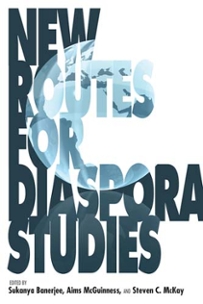
Study of diasporas provides a useful frame for reimagining locations, movements, identities, and social formations. This volume explores diaspora as historical experience and as a category of analysis. Using case studies drawn from African and Asian diasporas and immigration in the U.S., the contributors interrogate ideas of displacement, return, and place of origin as they relate to diasporic identity. They also consider how practices of commensality become grounds for examining identity and difference and how narrative and aesthetic forms emerge through the context of diaspora.
Study of diasporas provides a useful frame for reimagining locations, movements, identities, and social formations. This volume explores diaspora as historical experience and as a category of analysis. Using case studies drawn from African and Asian diasporas and immigration in the U.S., the contributors interrogate ideas of displacement, return, and place of origin as they relate to diasporic identity. They also consider how practices of commensality become grounds for examining identity and difference and how narrative and aesthetic forms emerge through the context of diaspora.
Satanic Mills or Silicon Islands? The Politics of High-Tech Production in the Philippines (2006)
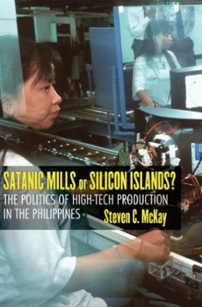
Winner of the 2007 Sociology of Labor Book Award (Labor and Labor Movements Section, American Sociological Association)!
Satanic Mills or Silicon Islands? challenges the myth of globalization's homogenizing power, arguing that the uniqueness of place is becoming more, not less important. Steven McKay documents how multinational firms secure worker control and consent by reaching beyond the high-tech factory and into local labor markets. He also traces the rise of a new breed of privatized export processing zones, revealing the state's—in these cases, the Philippines—revamped role in the wider politics of global production. Finally, McKay gives voice to the women workers themselves, as they find meaning, identity, and agency on and beyond the "new" shop floor.
This book deftly weaves together three critical strands of global studies: Southeast Asia as a key site of global production, the organization of work in advanced electronics, and working-class conditions under globalization. Drawing on the author's rich analysis of four multinational electronics firms—from their boardrooms to boarding houses—Satanic Mills or Silicon Islands? makes a unique contribution to the study of work, labor, and high-tech production.
Can precision medicine be personal; can personalized medicine be precise? (2022)
 People have always sought medical care that is tailored to every individual patient. Alongside with the historical development of institutions of care, the vision of personal and 'holistic' care persisted. Patient-centred medicine, interpersonal communication and shared decision making have become central to medical practice and services.
People have always sought medical care that is tailored to every individual patient. Alongside with the historical development of institutions of care, the vision of personal and 'holistic' care persisted. Patient-centred medicine, interpersonal communication and shared decision making have become central to medical practice and services.
This evolving vision of 'personalized medicine' is in the forefront of medicine, creating debates among ethicists, philosophers and sociologists of medicine about the nature of disease and the definition of wellness, the impact on the daily life of patients, as well as its implications on low-income countries. Is increased 'precision' also an improvement on the personal aspects of care or erosion of privacy? Do 'precise' and 'personalized' approach marginalize public health, and can this care be personalized without attention to culture, economy and society?
The book provides a multidisciplinary and interdisciplinary discussion of the ethos and ethics of precision/personal medicine, involving scientists who have shaped the field, in dialogue with ethicists, social scientists and philosophers of science. The contributing scholars come from all over the world and from different cultural backgrounds providing reflective perspectives of history of ideas, critical theory and technology assessment, together with the actual work done by pioneers in the field. It explores issues such as global justice, gender, public health, pharmaceutical industry, international law and religion, and explores themes discussed in relation to personalized medicine such as new-born screening and disorders of consciousness.
This book will be of interest to academicians in bioethics, history of medicine, social sciences of medicine as well as general educated readers.Edited by Y. Michael Barilan, Margherita Brusa, and Aaron Ciechanover with contribution by Jenny Reardon from their participation in the workshop, "The Revolution of Personalized Medicine: Are We Going to Cure All Diseases and at What Price?," that took place April 8-9, 2019 in Vatican City. Read more in this campus news article: Jenny Reardon participates in Vatican workshop on personalized medicine.
The Postgenomic Condition: Ethics, Justice, and Knowledge After the Genome (2017)
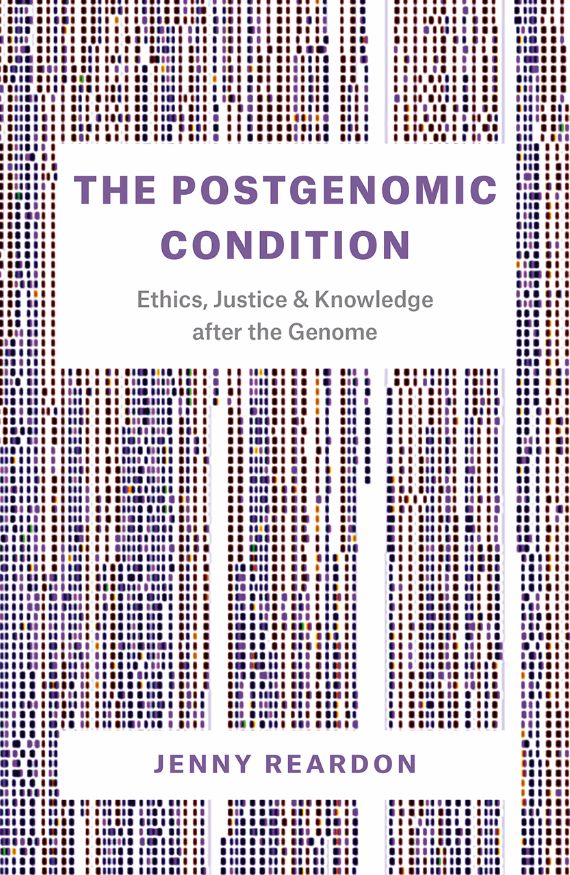 Now that we have sequenced the human genome, what does it mean? In The Postgenomic Condition, Jenny Reardon critically examines the decade after the Human Genome Project, and the fundamental questions about meaning, value and justice this landmark achievement left in its wake.
Now that we have sequenced the human genome, what does it mean? In The Postgenomic Condition, Jenny Reardon critically examines the decade after the Human Genome Project, and the fundamental questions about meaning, value and justice this landmark achievement left in its wake.
Drawing on more than a decade of research—in molecular biology labs, commercial startups, governmental agencies, and civic spaces—Reardon demonstrates how the extensive efforts to transform genomics from high tech informatics practiced by a few to meaningful knowledge beneficial to all exposed the limits of long-cherished liberal modes of knowing and governing life. Those in the American South challenged the value of being included in genomics when no hospital served their community. Ethicists and lawyers charged with overseeing Scottish DNA and data questioned how to develop a system of ownership for these resources when their capacity to create things of value—new personalized treatments—remained largely unrealized. Molecular biologists who pioneered genomics asked whether their practices of thinking could survive the deluge of data produced by the growing power of sequencing machines. While the media is filled with grand visions of precision medicine, The Postgenomic Condition shares these actual challenges of the scientists, entrepreneurs, policy makers, bioethicists, lawyers, and patient advocates who sought to leverage liberal democratic practices to render genomic data a new source of meaning and value for interpreting and caring for life. It brings into rich empirical focus the resulting hard on-the-ground questions about how to know and live on a depleted but data-rich, interconnected yet fractured planet, where technoscience garners significant resources, but deeper questions of knowledge and justice urgently demand attention.Race to the Finish: Identity and Governance in an Age of Genomics (2004)
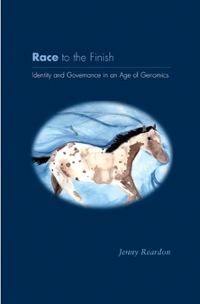 In the summer of 1991, population geneticists and evolutionary biologists proposed to archive human genetic diversity by collecting the genomes of "isolated indigenous populations." Their initiative, which became known as the Human Genome Diversity Project, generated early enthusiasm from those who believed it would enable huge advances in our understanding of human evolution. However, vocal criticism soon emerged. Physical anthropologists accused Project organizers of reimporting racist categories into science. Indigenous-rights leaders saw a "Vampire Project" that sought the blood of indigenous people but not their well-being. More than a decade later, the effort is barely off the ground.
In the summer of 1991, population geneticists and evolutionary biologists proposed to archive human genetic diversity by collecting the genomes of "isolated indigenous populations." Their initiative, which became known as the Human Genome Diversity Project, generated early enthusiasm from those who believed it would enable huge advances in our understanding of human evolution. However, vocal criticism soon emerged. Physical anthropologists accused Project organizers of reimporting racist categories into science. Indigenous-rights leaders saw a "Vampire Project" that sought the blood of indigenous people but not their well-being. More than a decade later, the effort is barely off the ground.How did an initiative whose leaders included some of biology's most respected, socially conscious scientists become so stigmatized? How did these model citizen-scientists come to be viewed as potential racists, even vampires?
This book argues that the long abeyance of the Diversity Project points to larger, fundamental questions about how to understand knowledge, democracy, and racism in an age when expert claims about genomes increasingly shape the possibilities for being human. Jenny Reardon demonstrates that far from being innocent tools for fighting racism, scientific ideas and practices embed consequential social and political decisions about who can define race, racism, and democracy, and for what ends. She calls for the adoption of novel conceptual tools that do not oppose science and power, truth and racist ideologies, but rather draw into focus their mutual constitution.
The Retreat from Race: Asian-American Admissions and Racial Politics (1993)
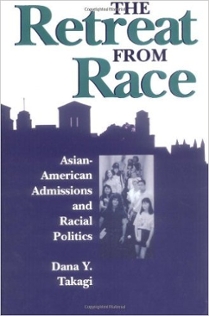
Winner of the Association for Asian American Studies's 1993 National Book Award, Social Science!
“An excellent book. Takagi takes a very complex and sensitive subject—racial politics—and shows, through a careful analysis . . . that changes in the discourse about Asian American admissions have facilitated a 'retreat from race' in the area of affirmative action. . . . This book will appeal to an audience significantly wider than a typical academic one.”— David Karen, Bryn Mawr College
Charges by Asian Americans that the top universities in the United States used quotas to limit the enrollment of Asian-American students developed into one of the most controversial public controversies in higher education since the Bakke case. In Retreat from Race, Dana Takagi follows the debates over Asian-American admissions at Berkeley, UCLA, Brown, Stanford, Harvard, and Princeton. She explains important developments in the politics of race: changes in ethnic coalitions, reconstruction of the debate over affirmative action, and the conservative challenge to the civil rights agenda of the 1960s. Takagi examines the history and significance of the Asian American admissions controversy on American race relations both inside and outside higher education.
Takagi's central argument is that the Asian-American admissions controversy facilitated a subtle but important shift in affirmative action policy away from racial preferences toward class preferences. She calls this development a retreat from race. Takagi suggests that the retreat signals not only an actual policy shift but also the increasing reluctance on the part of intellectuals, politicans, and policy analysts to identify and address social problems as explicitly racial problems.
Moving beyond the university setting, Takagi explores the political significance of the retreat from race by linking Asian-American admissions to other controversies in higher education and in American politics, including the debates over political correctness and multiculturalism. In her assessment, the retreat from race is likely to fail at its promise of easing racial tension and promoting racial equality.
